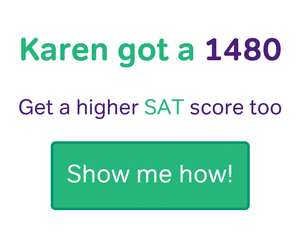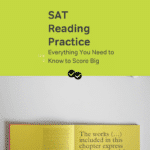Note: This post has been updated to reflect changes in the SAT beginning March 2016 (aka the “New” SAT).
Below you’ll find a list of the absolute best SAT Reading tips out there to help you crush the new SAT, starting with our top 5 strategies for the test. Keep reading on for our advice on how to avoid common wrong answers on the SAT, special tips for the vocabulary in context questions, and finally how to use the varying difficulty level of SAT reading passages to your advantage. Consider this your COMPLETE GUIDE to SAT Reading success!
Use the links below to jump to each section:
-
SAT Reading Top 5 Tips
SAT Reading Strategies to Avoid Wrong Answers
SAT Words in Context Strategy
How to Use Passage Complexity to Your Advantage on the SAT Reading
Top 5 Tips for SAT Reading
1. Read the entire Reading Comp. passage
There used to be this urban myth that you could ace the Reading passages by reading the questions first and then going back to the parts of the passage the questions tell you to. I am guessing this legend might fade a bit now that there are fewer line number questions on the SAT, meaning the questions aren’t going to tell you exactly where to look for the answer. You have to hunt for it, or remember where you saw it. The cruelty!
Now we aren’t saying you can’t still get a few questions right using this tactic, but if you skip the passage altogether, you are likely to miss many questions that relate to the general ideas in the passages. You are also likely to spend more time trying to choose between two answers, because you simply don’t have the context that you can only get by reading the passage.
So let us say it loud and clear: Always read the entire passage first.
2. Get the big picture
Doing well on the SAT reading passages about understanding what the passage is about in general. If you find yourself stringing words together, hoping just to reach the end of a passage that is nothing less than torture, you are actually hurting yourself. It is not about getting to the end of the passage; it is about understanding the passage.
3. Watch out for the swamp
Some people take the idea of trying to understand the passage to the other extreme. I have to understand every detail, they tell themselves. Many of these passages are constructed in such a way that there is a lot of dense, nasty material buried in the passages. Students often times get pulled into this swamp of words and complex ideas, believing that to answer the questions, they have to understand the most complex part of the passage.
This is often not the case, as the questions typically deal with easier parts of the passage—or at least not exclusively on understanding two back-to-back difficult sentences. The key is understanding the topic sentences of the paragraphs, and feeling comfortable about glossing over the tough stuff—instead of getting stuck in a swamp of words.
4. Take snapshots
No, I’m not talking about taking pics from your iPhone. “Snapshots” refers to those little mental summaries you make in your head as you read. Each paragraph is a unit of information—important information that you should make a quick summary of while you reading. For instance, when you are done with the first paragraph, you should say something to extent of, “Ok, that was about a couple of reasons radio telescopes are important in hunting for aliens. Hmm…this paragraph just talks about one of those reasons, which is that….”
These summaries should not take you long—only a about five seconds or so. For those,who aren’t fast readers or used to summarizing stuff in their heads, you can also write mini-paragraph summaries in the margins (though I recommend building up to where you are comfortable making mental snapshots of each paragraph).
And remember: you are just going for the big ideas. Don’t get buried in the “swamp”, because it will disrupt your ability to understand the main ideas of the passage.
5. Get really excited
I know this sounds weird. After all, you are dealing with 800-word passages, what the %$@ is there to get excited about. But that’s the point: our natural tendency upon starting a reading passage is to fall asleep—or at least get bored. By convincing yourself that what you are about to read is so fun and entertaining—and thus boosting that pulse ever so slightly—you’ll be far more alert as you read.
By combining all the elements above, you are going to be far more prepared for those sneaky questions, and all those carefully placed traps in the answer choices. The key when applying these techniques is patient practice. You are not going to automatically start taking real clean “snapshots” as you excitedly make your way through a passage about the dispute regarding Linnaeus’s taxonomic contribution to natural science. But with practice, hey, you just might.
Tips to Avoid New SAT Reading Common Wrong Answers
Although the SAT is perhaps less tricky than it was in the past, that doesn’t mean you don’t still need to be on your guard. The New SAT Reading section is in some ways even better at luring you into tempting wrong answer choices because many of them seem so plausible. The new SAT is all about close and careful reading, so tread cautiously when it comes to the answer choices and always go back to the passage.
Here are some of the reasons wrong answers on the new SAT are just so darn tantalizing:
1. The answer is true based on information in the passage
Sometimes an answer choice is wrong because it doesn’t actually answer the question being asked. Sure, you can find supporting text for this wrong answer choice, but since it is not answering the specific question being asked, it’s not the right answer.
2. The answer sounds plausible
This is particularly true on the new SAT Reading test. Many of the answer choices will seem to be “on theme” with the main idea of the text. You may even think you remember reading a wrong answer choice in the passage. This is where careful reading comes in. You should always be going back to the text to backup your answer; you may find that the passage says something a little bit different from what you remembered, meaning this wrong answer is related, but not a precise recollection of the test.
3. The answer relates to the SAT Reading passage (but distorts its meaning)
Be careful! Did the passage actually say what the answer choice is saying? Or did it just talk about something similiar? Or did it talk about the opposite of what the answer choice says? Again, always go back to the text and stay true to your overall understanding of the main idea and author’s purpose.
4. The answer uses words and phrases from the SAT Reading passage (but incorrectly)
Sometimes you are going to struggle with understanding a part of the passage. If a question deals with this part of the passage, you’ll often find yourself going straight for the answers in the hope that they will offer some guidance. Doing so, however, is dangerous—the SAT is waiting for you.
It will often take words that appear in the passage and throw them into an answer. But if you are not processing the entire answer choice, and are just grasping on to those familiar words, you are likely to become trapped.
5. The answer is too specific or too general
Particularly for big-picture questions such as the main idea of the passage or a paragraph, or the purpose of a passage or section, make sure you don’t pick an answer choice that only mentions part of what the entire paragraph/passage addresses or something that is far bigger than the scope of the passage.
6. The answer seems ok (but not the best)
This one is specific to the Command of Evidence questions you’ll find on the new SAT, the ones where you have to pick the best lines of evidence in the text to support your answer to another question. Be careful to check all of the answer choices! You might come across an answer choice that seems to be decent support for the answer to the previous question (or at least you can rationalize that it is), but there might be a BETTER line to quote. So make sure you look at all of the options, even though it may feel tedious.
7. The answer is almost referring to the right line
This one is also specific to the Command of Evidence questions on the new SAT. The answer choices will look something like this: A. Lines 32-35 “The witch….her prey.” Sometimes you might see another answer choice that looks like this: B. Line 32 “The monster…the muffins.” In this case the same line number appears in both answer choices, because their respective text share a line, and if you aren’t being careful you might pick the wrong one, even though you correctly identified where the answer was. So be super careful you are looking at the right lines.
SAT Reading Strategy Practice
Below is a short paragraph with an SAT question following it . Your goal is to read the passage and answer the question (duh!), but, more importantly, to determine which wrong answer choices fall into which category above. Once you’ve done this, look at the analysis below the passage to see if you are right.
-
Arvo Part’s famous musical composition Cantus in Memoriam Benjamin Britten begins and ends in silence. After three beats of stillness, one musician rings a bell three times with the slow solemnity of a death toll. The sounds of silence and death give way to the pure voice of strings which flows along in their wake. After a sublime, sorrowful opening in A minor, the violin beckons the warmer C major scale into the pulse of the piece. The strings follow one another on a quest for the deepest note, until finally each holds a long, steady low C, then breaks into silence. It is just one of Part’s modern compositions in the classical style, and it perfectly reveals the man and his music.
The main purpose of the paragraph is to:
A. explain the purpose of Part’s music.
B. describe the experience of listening to Part.
C. explain how Part’s musical composition reveals his personal feelings.
D. demonstrate the importance of silence in music.
Practice Question Explanation and Analysis
First of all, the answer is B. The paragraph describes the movements of a piece of music, focusing on the listener’s subjective experience as he or she listens to the “slow solemnity of a death toll” followed by the “pure voice of strings” and so on.
Now let’s talk about what makes each of the other answer choices wrong, and why they are such common wrong answers on the SAT:
A. Yes, the paragraph is about “Part’s music,” but go back to the text and look carefully. Is an answer ever given as to its purpose? I would put this answer choice in category 2: “sounds plausible.” You have to go back to the passage and think carefully.
C. There is a phrase at the end of the paragraph that might make this one tempting: “reveals the man and his music.” And there are sensory words throughout that might seem to reflect feelings: “sublime,” “sorrowful” etc. But the paragraph does not say anything about Part’s personal feelings. And it does not say that the feelings the music might evoke in listeners are Part’s personal feelings, so be careful of inferring too much. This is a category 3 error: it is based in the passage but distorts its meaning.
D. Silence is mentioned several times, making this a tempting answer choice. But be careful! This paragraph is specifically about Part’s music, not music overall. This means this wrong answer choice fits into category 5; it’s too general.
When you practice SAT Reading, and review your practice tests, train yourself to look for the patterns in wrong answer choices. Doing so will help you avoid making these mistakes on the real deal.
Tips for SAT Reading Words in Context Questions
The old SAT tested a lot of difficult vocabulary. No more. Now the focus is on “high-utility academic words and phrases” which basically means words that are used in multiple subjects and genres and words that have multiple meanings.
There are two types of Words in Context questions. The first type requires you to correctly identify the definition of a word (remember these are typically common words with multiple meanings). The second type will ask you to identify how an author uses a word or phrase to influence the meaning, tone, or style of a passage.
How the New SAT Tests Vocabulary
Here’s an example of what a word in context question looks like:
As used in line 22, the word “contained” most nearly means to
-
A. sheltered
B. suppressed
C. enclosed
D. incorporated
Contain is not a hard vocab word. So it’s not about knowing what “contain” means; it’s about what it means “in context.” In different contexts, “contain” can mean different things. So we need to figure out what it means in this passage.
Strategy for SAT Reading Words in Context Questions
Your strategy should be to go back to the passage and read not only the sentence the word appears in but also the sentence above and below it. Make sure that you understand how that sentence is supposed to connect to the ones around it.
Then put a blank in the sentence where the word appears. Go ahead and cross it out. Come up with your own word or phrase that expresses what the sentence is saying. Don’t worry about finding the perfect word, just get something down that communicates what the sentence is trying to communicate.
Let’s try it.
-
It may seem as if the Bubonic Plague is a vestige of the Middle Ages. Most high school students have read about it and its mass devastation of European lives in the fourteenth century. But although the plague may occasionally have been contained, it has resurfaced periodically in various locations around the globe from the 6th century to the 21st century. It is hardly a historical relic.
If I replace the word “contained” myself, I might come up with “stopped” or “prevented from spreading.” These match up best with answer choice (B) “suppressed.” We can see how, in other contexts, “contained” might mean the other answer choices: “The school contained/sheltered the students during the tornado.” “The sheep were contained/enclosed within the pen.” “The lesson contained/incorporated six modules on good writing.” But that’s not what it means here.
Try not to just start plugging in the answer choices from the very beginning. This turns on the how-it-sounds part of your brain instead of the analytical part of your brain (you can probably guess which one the SAT rewards). Only plug words in if you are totally confused and can’t come up with your word.
Remember that the SAT often chooses a second (or third or fourth) definition of a word and not the one that you are most familiar with. So always go back to the passage.
Although they are far less common, a word in context question may also ask you to determine why an author chose to use a certain word to achieve a certain effect.
Here’s an example:
In line 34, the author most likely used the word “heralded” to:
-
A. echo the idea that the press release acted like a live messenger.
B. emphasize the global acclaim the discovery received.
C. imply that the announcement was fortuitous.
D. highlight the fanfare the press release received.
These questions are tougher because you can’t use the fill-in-the-blank technique. Rather these questions rely on an understanding of main idea and tone and are really more like analysis questions. They are far more rare than the other type of words-in-context questions, however, but be alert for them. The best way to handle these questions is to remind yourself of the main idea of the passage or section.
Strategy to Use Passage Complexity to Your Advantage on the SAT Reading Test
If you are at all familiar with the SAT Reading test, you probably know that the passages vary in difficulty. You might breeze through some of them and then be sweating bullets through others not having any idea what the heck the last paragraph was talking about. This is ok. This is what makes the SAT hard, and you should know that there are a lot of other students struggling along right beside you. But, if you are prepared, there can be a huge difference between you and these other freaked-out students gnawing off their pencil erasers around you, and that is, the level of panic you experience when you encounter a difficult reading passage. Knowing what to expect can help you make strategic decisions about which passages to do first.
The new SAT makes this a little easier on you since you’ll face 5 different passages, all about the same length and all with the same number of questions. So if you struggle with Reading, you can start with the easier passages first and make sure you have the time do a solid job answering those questions.
Although you won’t know in advance which passages are going to be easier or harder, you do know that the SAT has a predetermined difficulty range for these passages. The easiest passage is going to be at about a 9th grade reading level and the hardest passage is going to be at an early college level. The others are going to be somewhere in the middle.
What order should I do SAT Reading Passages in?
You can apply one of the following strategies to quickly determine which passages you should tackle first:
- Read the first paragraph (or first two paragraphs if the first paragraph is only a sentence or two). Particularly on non-fiction passages, the introductory paragraph should be one of the most readable paragraphs of the text, and the passages often get more dense in the middle or two-thirds of the way through. So if you read the first paragraph and think, “Whoa, this is going to be hard,” chances are it is a hard passage and you can come back to it after you’ve knocked off some easy ones.
- Skim through the passage quickly, reading just a few select sentences throughout. You’re probably better at eyeballing passage complexity than you think you are. Just think about if your English teacher handed you a printout of excerpts from The Three Little Pigs and Crime and Punishment with the titles removed. You could probably tell at a glance which is the harder passage, right? The differences might not be so extreme on the SAT, but chances are your gut instinct after a 10-second scan might tell you which passages to tackle first.
Definitely don’t waste a lot of time making decisions, and if you’ve already read half of a passage before deciding it’s difficult, this is not the time to bail. Skipping around the test reading parts of passages is not going to help you get answers on your bubble sheet, so make quick decisions and go all in.
A special tip for SAT Reading passage topics
Some students just HATE fiction. It is the WORST. Other students find themselves stifling snores when they read about science. If you have strong feelings about genre or passage topics, you may want to make some ordering decisions based on this rather than passage complexity. Remember that there will be one fiction passage, two history/social studies passages, and two science passages on every test (hint: the fiction generally comes first and the history/social studies and science passages alternate), so if you’ve had a bad breakup with one subject or another in the past, you might want to arrange your reading order based on personal preference rather than passage complexity.






Leave a Reply